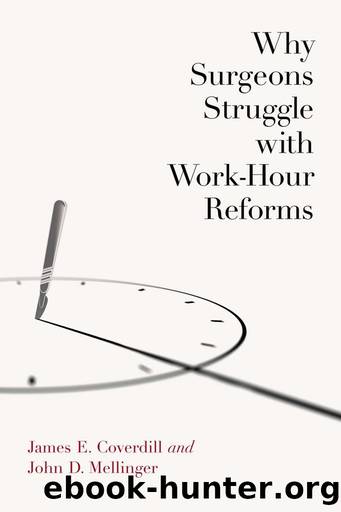Why Surgeons Struggle with Work-Hour Reforms by James E. Coverdill John D. Mellinger

Author:James E. Coverdill, John D. Mellinger [James E. Coverdill, John D. Mellinger]
Language: eng
Format: epub
Tags: Social Science, Disease & Health Issues, Medical, Surgery, General, Law, Medical Law & Legislation
ISBN: 9780826501073
Google: CHUTEAAAQBAJ
Publisher: Vanderbilt University Press
Published: 2021-01-15T02:49:11+00:00
Notes. An asterisk indicates differences by gender or years of experience are significant at the P < .05 level, as determined by a chi-square test statistic. Samples sizes for the group analyses differ slightly from the overall total due to non-response with respect to gender (four cases) and experience (twelve cases).
We begin by reviewing the overall results presented in the âtotalâ column that is to the right of each question. The first three items explore professionalism and closely mirror what is commonly expressed by surgical societies. Nearly all surgeons agree that they should be responsible for the continuum of care for their patients (item 1 at 96 percent) and that they must accept inconvenience if it is needed to meet patient needs (item 3 at 97 percent). In this context, inconvenience is interpreted largely as needing to come in early, stay late, or return to the hospital. To a lesser but still substantial extent, surgeons believe that professionalism means âputting patients firstâ by subordinating their own self-interests (item 2 at 79 percent). Items 4 through 7 probe ways the reforms might conflict with professionalism. Large majorities believe that the reforms diminish familiarity with patients (item 7 at 82 percent) and encourage an unprofessional shift mentality (item 5 at 85 percent); few believe that the reforms fully support the practice of doing what is best for patients (item 6 at 17 percent). The results suggest widely held views and conflicts between the reforms and professionalism.
The final five questions (8â12) explore elements of change. For example, a few surgeons, in informal conversations and during the fieldwork, suggested that core professional values should change over time, and that professional values impose guidelines for behavior, not obligations. Item 8 suggests that about 27 percent of attendings agree that traditional ideals regarding âputting patients firstâ and âcontinuity of careâ should change with the times. That minority view reflects a theme found in the interviews. It is also the first question that shows a statistically significant gap across levels of experience. While most believe that professional obligations often conflict with their family and nonwork obligations (item 11 at 79 percent), they are less likely to say that orientations to âwork-life balanceâ conflict with the tradition of subordinating self-interests (item 10 at 34 percent). This latter issue prompts the only statistically significant difference by gender, and it produces a second and final divergence across experience levels. In our interviews, this view tends to blend with another, namely the need to take care of yourself before you can care for others (item 12).
Before turning to the interviews to further draw out forms of dissent, it is worth emphasizing a prevailing pattern: the results suggest shared views, not those that diverge often or sharply by gender or experience. Of the twelve items considered, gender mattered for one, experience for two. In a similar way, the dissenting views that we now turn to are not exclusively or even primarily championed by one or another sub-group of surgeons.
Dissent takes two main forms.
Download
This site does not store any files on its server. We only index and link to content provided by other sites. Please contact the content providers to delete copyright contents if any and email us, we'll remove relevant links or contents immediately.
Not Your Mother's Divorce by Kay Moffett(50)
Exposed by WILLIAM BERNHARDT(47)
Framing Abuse by Jenny Kitzinger(46)
Polygamy in Primetime by Janet Bennion(43)
Bioethics and Biopolitics in Israel by Hagai Boas Yael Hashiloni-Dolev Nadav Davidovitch Dani Filc and Shai J. Lavi(43)
Why Surgeons Struggle with Work-Hour Reforms by James E. Coverdill John D. Mellinger(41)
Divorce in Nevada by Willick Marshal S;(40)
Not Just Roommates by Elizabeth H. Pleck(38)
Do Talk To Strangers: A Creative, Sexy, and Fun Way To Have Emotionally Stimulating Conversations With Anyone (how to talk to anyone, how to attract women, ... to make friends, how by Matt Morris(38)
Hopes for Better Spouses by Roeber A. G.;(33)
The History of Marriage Equality in Ireland: A Social Revolution Begins by Sonja Tiernan(32)
We Do! by Jennifer Baumgardner(30)
Causation in Law and Medicine by Mendelson Danuta;Freckelton Ian; & Danuta Mendelson(28)
The Equal Parent Presumption by Kruk Edward;(26)
Principles and Practice of Trial Consultation by Stanley L. Brodsky(26)
Divorce in Tennessee by Burch Eric J.;(25)
Juvenile Law 2022 by John Sofis Scheft(23)
Divorce in Nebraska by Koenig Susan Ann;Koenig Susan Ann;(23)
Divorce in New York by Stutman Michael;(23)
